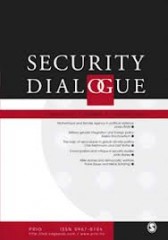Topic: NATO
» Notes on European political culture
28
Mar
2011
The International Community recreates itself
The International Community’s role in the crisis in Libya changed dramatically when NATO Secretary General Anders Fogh Rasmussen announced on Saturday that NATO Allies ‘have decided to take on the whole military operation in Libya under the United Nations Security Council Resolution’ (see announcement here). The step, he continued, ‘proves NATO’s capability to take decisive action’. Fogh Rasmussen explained that NATO had already in the previous week put together ‘a complete package of operations in support of the United Nations Resolution by sea and air’. The Secretary General in effect suggested that NATO would take over leadership in principle that de facto is exercising.
Security Council Resolution 1973 was in many regards momentous and without precedent. It builds on principles developed but never fully implement in the doctrine of Responsibility to Protect. Born in the 2001 report of an intergovernmental commission, it central provisions have survived in the fine print of a number of UN resolutions and documents. The doctrine essentially asserts that states have a responsibility to protect their populations from genocide, war crimes, ethnic cleansing, etc. and that where they fail to take action on this responsibility, or are themselves the actual cause of these sufferings, then the responsibility falls to the International Community. Though the resolution does not mention the doctrine, it specifically evokes its language.
The immense challenge that immediately unfolded was a practical one. Who is to implement? Who will apply the no fly zone called for in the Resolution? Who will protect the citizens as required in the Resolution? In the Resolution it is ‘Member States’, ‘acting national or through regional organization or arrangements’ to ‘to take all necessary measures to protect civilians under threat of attack in the country who are under threat or attack’. The Resolution ‘authorizes’, but does not require Member States to act, nor does it specify which Member States should implement.
Arguably this ambiguity plays an important role in making political action possible. Without it, many potential participants in an international action would remain reluctant. The International Community is self-organizing. That is its virtue and its bane. In its response to the Resolution it is a certain International Community, not necessarily the International Community that rises to the challenge. Which one? [ More… ]
1
Feb
2010
NATO redux in Paris
In a speech to the French National Military Academy on 29 January US Secretary of State Hillary Clinton did her best to press the old wine of 20th Century security thinking into the new bottles of a shifting European security landscape.
The speech in its entirety can be found here. The report and analysis from Le Monde can be found here and here.
Europe’s political class is still scrambling to find its footing at the dawn of the era of the Lisbon Treaty and the new architecture of power, legitimacy and politics it is producing. The European Council of Ministers is consolidated around a new ‘president’ of Europe, the EU has a distinct new foreign policy and security spokeswoman and a beefed up operational capacity of the European Parliament.
Add to this the fact that NATO is itself in the middle of its own identity crisis. It’s own 1999 Strategic Concept is generally considered obsolete, and a highly visible, multi-national fact-finding and consensus building exercise is under way in order to identify a new one. The group of experts assigned the task is led by none other than Cold Warrior Madeline Albright.
In terms of the trans-Atlantic and European politics of security, the present juncture rivals 1989 and the transformation of the Cold War concept of security. [ More… ]
» Publications - briefs & opinions
» Talks - public lectures
What is new and what is old in NATO’s strategic concept?
Preparatory conference for NATO’s summit in Oslo, Norwegian North Atlantic Committee and NorPeace, 16 April.
Download
Norway, Article V and the New Strategic Concept
Centre for International Relations, Warsaw, Poland, Seminar on Changing NATO and the Central and East European Agenda, 8 March.
Download











